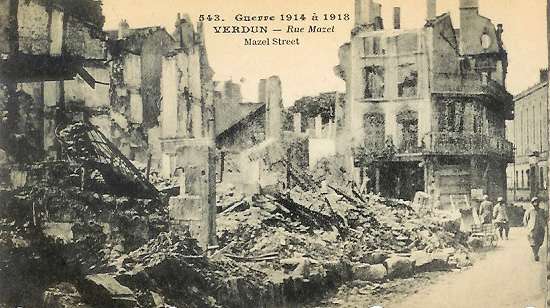In May 1918, Simpson County, Kentucky native James Knox Polk Lambert (1864-1960) left his Chicago law practice to volunteer with the YMCA in ministering to American soldiers fighting overseas. During his 15-month tour in England and France, Lambert witnessed the transformation of Europe: a last-ditch German offensive, the Armistice, the wild celebrations following successful negotiation of a peace treaty, and the appalling destruction left behind by the war. He kept a diary of his activities, and reflected on his experiences in a lengthier journal. Both are now part of the Manuscripts & Folklife Archives collections of WKU’s Department of Library Special Collections.
After the U.S. entered the war, the YMCA was charged with bolstering the welfare and morale of American soldiers with entertainment, educational, religious and other programs. The end of hostilities, however, did not signal the end of the YMCA’s mandate. Millions of weary servicemen now turned their eyes toward home, and James Lambert and his colleagues faced the daunting task of keeping them emotionally, spiritually and recreationally occupied as they endured the logistic and bureaucratic trials of mass demobilization.
In addition to the ruin the war brought to the French countryside, Lambert was most struck by the ferocious impatience of the soldiers awaiting repatriation. “The months of January, February and March [1919],” he wrote, “were marked by the most intense agitation of the boys to go home.” He found most soldiers he encountered “in the grip of that mania,” unreconciled to the fact that, even at an exit rate of 300,000 men per month, it would take 7 months to get everyone home. Some of the men, observed Lambert, were obsessed with a rumor that the government was secretly plotting to keep them in the Army for life; so high was the level of anxiety that General John J. Pershing, Commander of the Allied Expeditionary Forces, actually feared a mutiny. When Lambert suggested that the men spend their time sightseeing and enjoying some postwar tourism courtesy of the YMCA, the reply was predictable: “I have seen enough. I never want to see this country again.” For all he had seen, however, James Lambert’s experiences at the close of the Great War marked the beginning of a lifelong fascination with European history and culture.
Click here to access a finding aid for the James Lambert Collection. For other collections about World War I, search TopSCHOLAR and KenCat.


